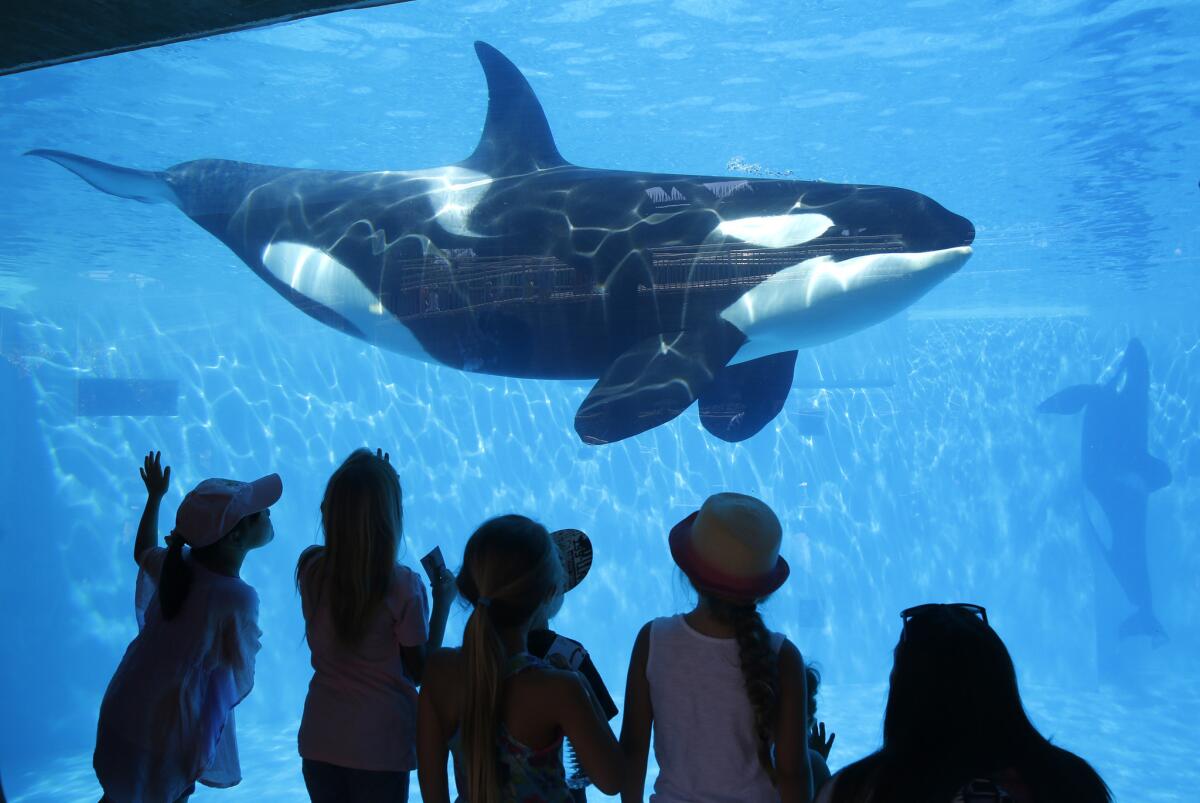SeaWorld workers posed as animal activists to spy on opponents, CEO acknowledges

SeaWorld San Diego visitors watch orcas in 2014.
- Share via
SeaWorld employees posed as animal rights activists in an attempt to spy on opponents, Chief Executive Joel Manby acknowledged Thursday.
The statement came at the end of a conference call to discuss SeaWorld Entertainment Inc.’s financial performance. Fourth-quarter earnings showed promising results, but company officials warned that 2016’s first quarter has been challenging. Shares of SeaWorld closed down $1.82, or 9.2%, at $18.01
Manby said the company’s board of directors has “directed management to end the practice in which certain employees posed as animal rights activists. This activity was undertaken in connection with efforts to maintain the safety and security of employees, customers and animals in the face of credible threats.”
Last year, People for the Ethical Treatment of Animals accused a San Diego SeaWorld employee named Paul McComb of posing as an activist to spy on them. McComb had been placed on leave during an investigation, and Manby said Thursday that McComb has returned to work.
The company hasn’t given any details about whether anyone was fired or disciplined as a result of the investigation.
PETA said Thursday that the organization plans to file a lawsuit over the spying incident. A PETA representative said the group also will consider taking action to prevent the organization from being infiltrated by its opponents in the future, although the type of action wasn’t specified.
SeaWorld, based in Orlando, Fla., also said Thursday that attendance was soft in the first quarter, which it blamed on a drop in international visitors — particularly from Brazil — and bad weather.
The negative news, combined with the spying acknowledgment, overshadowed a fourth-quarter earnings report that showed signs of improvement.
The company posted an adjusted loss of $9.6 million, or 11 cents a share. The results improved from a year earlier, when the loss was $17.8 million, but they missed analysts’ expectations.
SeaWorld generated $267.9 million in fourth-quarter revenue, up from $264.5 million in the year-earlier quarter.
Attendance rose by about 43,000 visitors, or 1%. Fewer people went to SeaWorld San Antonio, which the company attributed to changes to its Fun Card and “a lack of significant competitive offerings.”
Revenue for the full year declined slightly to $1.37 billion from $1.38 billion the previous year. Profit was $49.1 million, down from $49.9 million in 2014.
Last week, SeaWorld announced a management shake-up that includes the departures of Chief Parks Operations Officer Dan Brown and Chief Zoological Officer Brad Andrews. Those changes become effective April 1. SeaWorld would not say whether the management changes were related to the spying matter.
“The leadership changes we announced last week are another important step on our road map to stabilization and growth,” Manby said in a statement.
More to Read
Inside the business of entertainment
The Wide Shot brings you news, analysis and insights on everything from streaming wars to production — and what it all means for the future.
You may occasionally receive promotional content from the Los Angeles Times.












